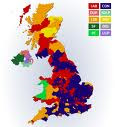Democracy.

A further topic of some interest relates to electoral law. This subject has an extensive history. Electoral law is (basically) aimed at ensuring that elections are free and fair. They have not always been (see Great Reform Act 1832) and there have been some concerns raised over the increase, since 2001, in the use of postal voting. The Representation of the People Act 1983 contains a number of "electoral offences": bribery; treating and undue influence. Instances of these offences have been thankfully rare in recent times. Interestingly, even when they occur, it would seem that the Crown Prosecution Service (CPS) will consider a number of factors before actually instituting a prosecution. The 1983 (Part III) also contains a process by which an election may be challenged by way of a parliamentary election petition in the High Court.
The right to vote is a precious thing which we must be vigilant to protect- see Telegraph 17th March 2010.
- Parliament Dissolved ~ The Fight For Power At Westminster Commences
Today (30th March), Parliament was dissolved. The coalition government remains in place pending the outcome of the General Election on 7th May and it may remain in place for some time beyond the election (see later). At present, the opinion...
- House Of Lords Reform - Bill Introduced
The House of Lords Reform Bill has been published. See the Bill as introduced - (pdf). Some time ago, Law and Lawyers looked at House of Lords reform - Plantagenet Palliser - after 100 years, will Lords reform arrive? A basic democratic principle...
- The Ian Tomlinson Case - A Manslaughter Prosecution: Victims Commissioner: Fixed Term Parliaments And Other Bills
Politicians at G20 in 2009The Crown Prosecution Service (CPS) has announced that there is to be a prosecution for manslaughter in relation to the death of Mr Ian Tomlinson. P.C. Simon Harwood is to be charged. It is a matter of public record...
- Fixed-term Parliaments Bill ... More Constitutional Tinkering ....
In July 2010, the government introduced a Bill to establish five year fixed term Parliaments - see Fixed-term Parliaments Bill. Is this Bill either desirable or necessary? Under present arrangements, a Parliament has a maximum term of 5 years - Septennial...
- Formal Powers Of The Crown: New Acts Of Parliament: General Election
Tuesday 6th April: Gordon Brown went to Buckingham Palace and asked H.M. The Queen to Dissolve parliament. She duly obliged. A number of Bills were then passed into law as part of the so-called "wash up". Each of those Bills quickly...
